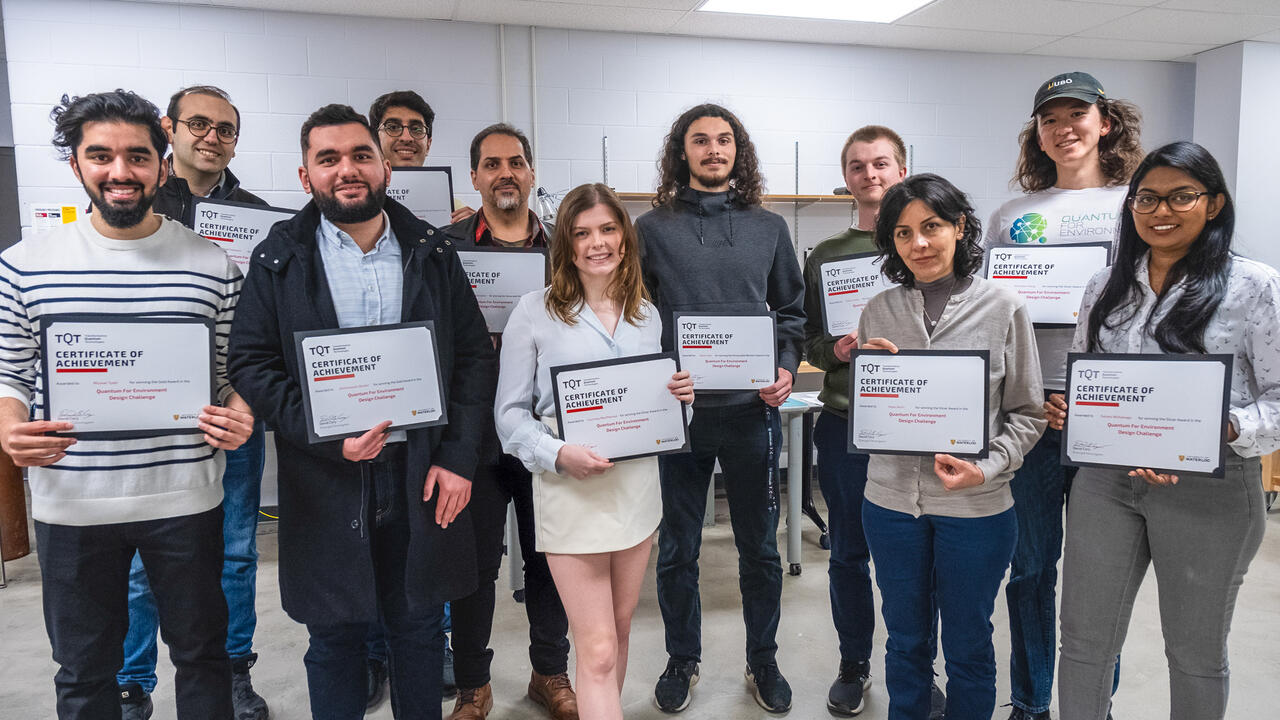
Designing for a sustainable future using quantum technologies
12 Waterloo students and postdoctoral fellows receive up to $10,000 in funding to develop their green-tech solutions

12 Waterloo students and postdoctoral fellows receive up to $10,000 in funding to develop their green-tech solutions
By Angelica Marie Sanchez University RelationsOn April 18, Transformative Quantum Technologies (TQT) awarded six research teams and their design ideas for the Quantum for Environment (Q4Environment) Design Challenge, whose green-tech solutions address global environmental issues. Ideas included using quantum computing to improve medical devices, and sensors that can detect microplastics and toxic nanomaterials in our oceans.
TQT and the Institute for Quantum Computing (IQC) aims to engineer quantum processes to advance new solutions to societally important problems. Quantum theory is the ultimate law of nature. At its most fundamental level, nature is governed by quantum physics. So, it is natural to look for quantum solutions when efficiencies, precision and sensitivity beyond what the classical world allows are required.
However, a big inventive step is needed since we as classical beings experience the world through a classical lens. Creativity is essential to discover where a quantum device can have impact. To help mine for such impacts, TQT has run a series of focused design challenges, reaching out to the broad Waterloo community to solicit ideas for quantum-enabled solutions. The past design challenge explored Quantum for Health.
“There's a lot of applications when it comes to quantum. In general, I think there’s a very good opportunity for interdisciplinary research between quantum and energy research,” says Miswar Syed, a master’s student in the Faculty of Engineering, who participated in the Q4Environment Design Challenge with his research partner, Amirhossein Boreiri.
Syed, whose research interest focuses on renewable energy, explains how the Paris Agreement in 2016, has a goal of reducing the global temperature lower than 1.5 degrees Celsius in pre-industry levels. He’s concerned that if we don’t achieve this goal by 2050, our society will have caused irreversible damages to the environment.
That’s where Syed and Boreiri’s design proposal comes in.
Syed and Boreiri, co-founders of Swish, are developing a green-tech solution for cleaning solar panels that have accumulated dust, debris and snow which reduces their efficiency. Solar panels are used as a source of renewable energy and reduces greenhouse gas emissions in both residential utility and commercial scale. But the common problem they found with cleaning solar panels is the large amount of water usage.
To address this global environmental issue, Syed and Boreiri submitted their design idea of a novel dual function self-cleaning device that effectively cleans solar panels in a sustainable and economical way without the use of water or expensive cleaning robots.
“We didn't even know what we were trying to build has some elements of quantum,” Syed says. "Our background is not in quantum so it's better when it's collaborative. That's why collaborative research is important because as traditional electrical engineers, we don't know that these technologies exist and how we can make things more efficient or faster. Collaborative research is essential because when someone else comes in and they understand the problem, then they suggest a solution, we can work together to solve this issue of the energy crisis that we're facing.”
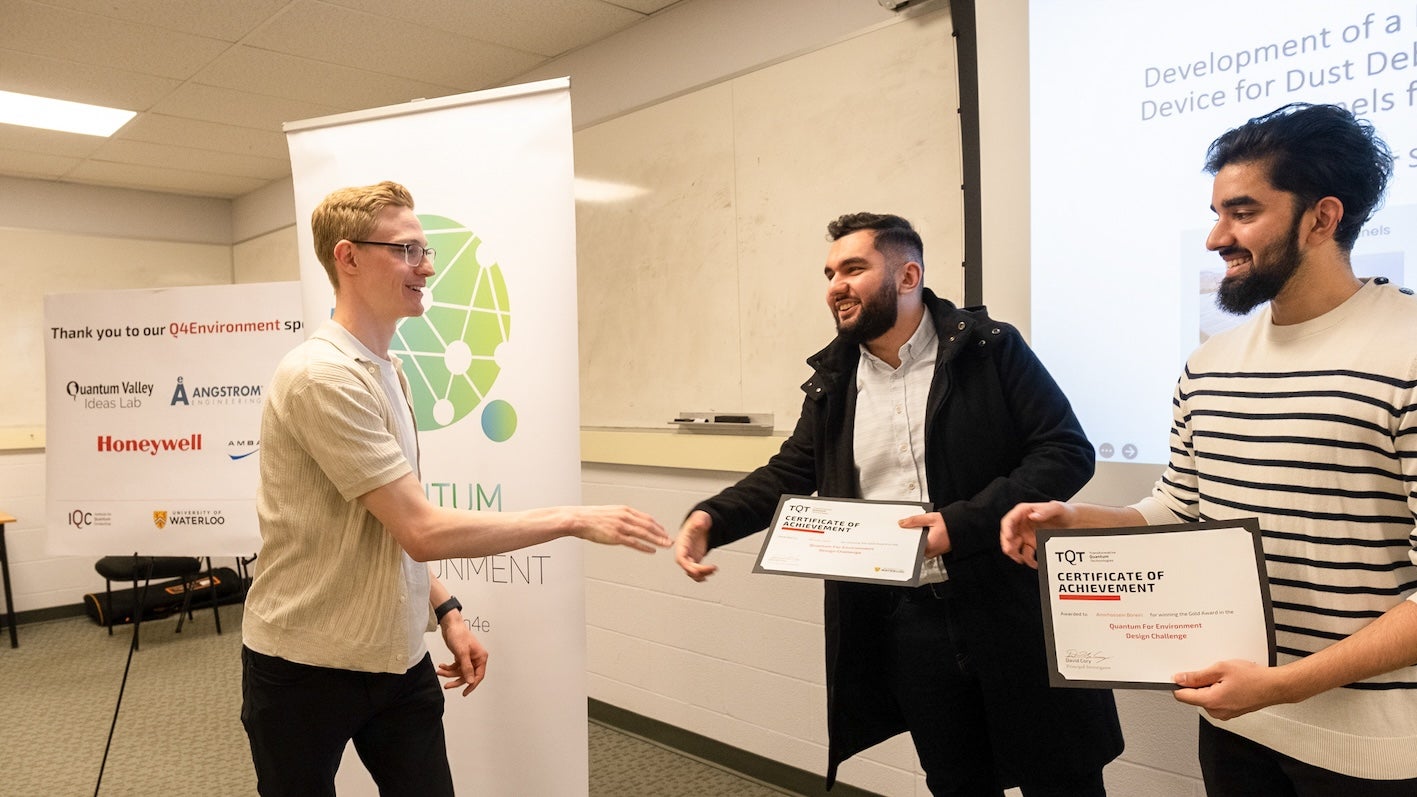
Transformative Quantum Technologies (TQT) present the Gold Award to Waterloo master's students, Amirhossein Boreiri and Miswar Syed, who are developing a green-tech solution for cleaning solar panels that have accumulated dust, debris and snow which reduces their efficiency.
The team’s green-tech solution received the Gold Award along with $10K funding to help accelerate their research and development stage before they can reach their next milestone, pilot testing.
Syed credits Connor Kapahi, who received last year’s Gold Award at the Quantum for Health Design Challenge, for introducing him and Boreiri to the TQT program. Both Kapahi and Syed pitched at the spring 2023 Velocity Pitch Competition and received additional funding for their innovative technology.
TQT held the Q4Environment Design Challenge to explore for opportunities where quantum technology can impact the environment. A total of six teams of 12 Waterloo students and post-doctoral fellows were awarded for their design proposals, proving how quantum-based ideas can lead to innovation in the environment both in the near and long term.
“I feel like the possibilities are there and we need more interdisciplinary integration … because as an environmental scientist, I wouldn't even have thought of looking into quantum solutions. If not for this design challenge, I feel like there would be a lot more myths out there in different fields and not just in environment,” says Hajar Alviri, a graduate student in the School of Environment, Enterprise and Development, whose team received the Silver Award for their design proposal on preserving the coastal ecosystems.
Alviri’s research partner, Sohani Withanage, believes if there were more opportunities to participate in design challenges that are interdisciplinary, we can see more applications in environmental protection.
As part of the University’s commitment to building a better future, Waterloo researchers and students are pioneering basic and applied research in different areas of quantum, by creating new technologies, investigating human-technology interactions and exploring how to mitigate risks. TQT is a collaborative research initiative led by Waterloo and IQC, aimed to accelerate the development and implementation of impactful quantum devices.
The Q4Environment Design Challenge allows for students and postdoctoral fellows — who may not have deep knowledge of quantum concepts or the environment — to have the opportunity to collaborate with one another. The six teams come from the faculties of Arts, Environment, Engineering and Science, whose experience range from basic to expert-level understanding of the quantum and environmental fields.
“These challenges are a key step in connecting Waterloo and IQC’s excellence in quantum information to emerging areas of impact,” says David Cory, a professor at the IQC and a principal investigator at TQT. “The hope is that the quantum design challenges will seed new activities that advance the capabilities of quantum technologies, connect them to important questions and help jump start quantum industries in Canada.”
From highly selective chemical sensors for environmental monitoring to improved efficiency solar cells, the recipient teams have designed solutions to help address the world’s most challenging environmental problems.
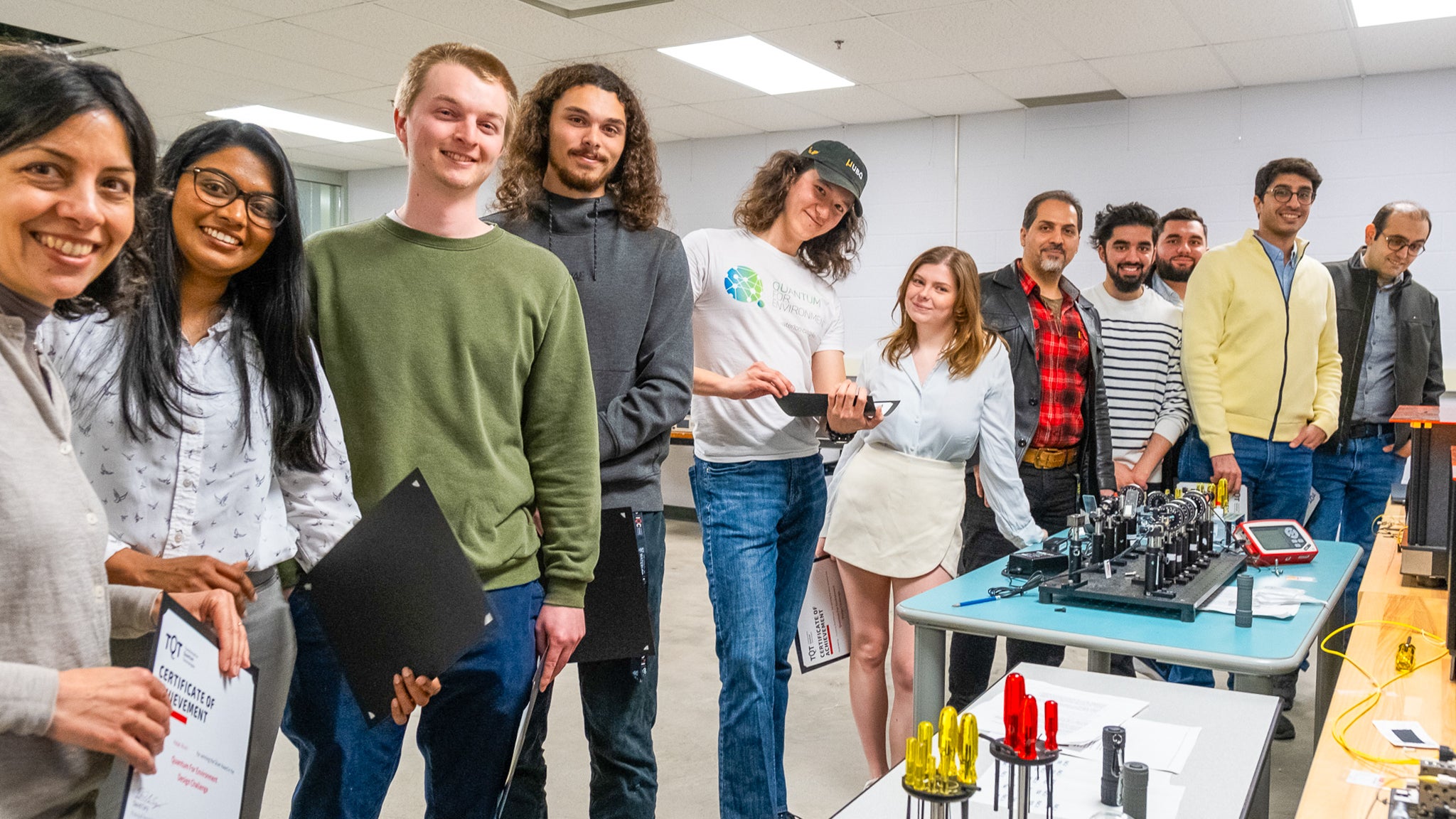
Recipient teams of the Q4Environment Design Challenge gather around a research lab inside the Research and Advancement Centre (RAC) 1 building.
The following teams were awarded to help further develop their ideas:
Development of a novel dual function self-cleaning device for dust debris and snow removal from solar panels for improved efficiency, Gold Award — $10,000
Miswar Syed, Faculty of Engineering (graduate student)
Amirhossein Boreiri, Faculty of Engineering (graduate student)
A real-time approach to monitoring sunscreen pollution in coastal waters using quantum-based technology, Silver Award — $1,500
Hajar Alviri, Faculty of Environment (graduate student)
Sohani Withanage, Faculty of Environment (graduate student)
Insect-based carbon quantum dots: highly sensitive pollutant sensing in environmental contexts, Silver Award — $1,500
Nicholas Cheng, Faculty of Science (graduate student)
Courtney MacPherson, Faculty of Arts (undergrad student)
Towards the next generation of photoconductive antennas for resin overuse control, Silver Award — $1,500
Milad Entezami, Faculty of Engineering (PhD student)
Seyed Ali Hosseini Farahabadi, Faculty of Engineering (PhD student)
A neutron cavity sensor for probing microplastics, lithium batteries and toxic nanomaterials, Honourable Mention — $500
Owen Lailey, Faculty of Science (graduate student)
Davis Last, Faculty of Science (undergrad student)
Quantum AI assistant for improving material synthesis for CO2 absorption and conversion, Honourable Mention — $500
Hossein Mashhadimoslem, Faculty of Engineering (postdoctoral fellow)
Shayan Ghasem, Faculty of Engineering (master’s student)
The Q4Environment Design Challenge was made possible by Quantum Valley Ideas Laboratory, National Research Council of Canada, Honeywell Aerospace, Angstrom Engineering, and Ambature. Visit the Transformative Quantum Technologies website to learn more about the Q4Environment Design Challenge.

Read more
Here are the people and events behind some of this year’s most compelling Waterloo stories
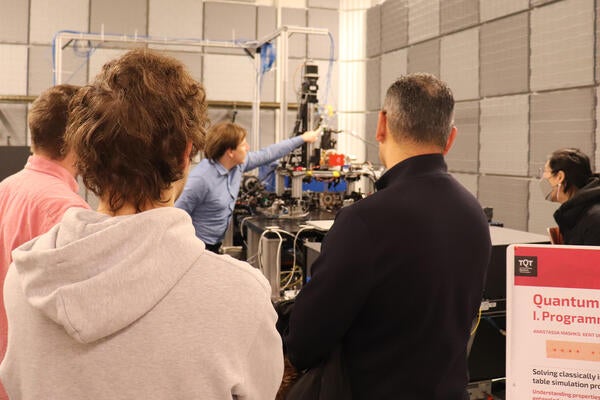
Read more
TQT Quantum Opportunities and Showcase sheds light on quantum research advancements, discoveries and real-world applications
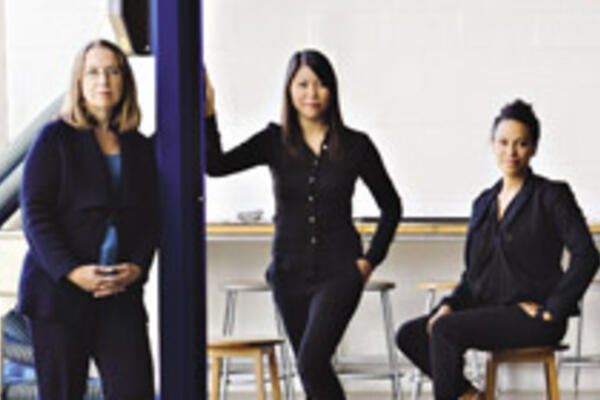
Read more
Special issue of Waterloo Magazine celebrates women who lead, and explores equity in education and the workplace
The University of Waterloo acknowledges that much of our work takes place on the traditional territory of the Neutral, Anishinaabeg and Haudenosaunee peoples. Our main campus is situated on the Haldimand Tract, the land granted to the Six Nations that includes six miles on each side of the Grand River. Our active work toward reconciliation takes place across our campuses through research, learning, teaching, and community building, and is co-ordinated within the Office of Indigenous Relations.